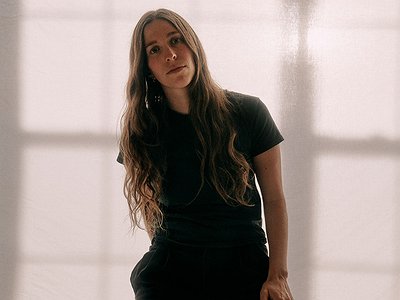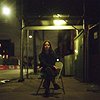Part 2
Could you describe your creative process on the basis of a piece or album that's particularly dear to you, please? Where did the ideas come from, how were they transformed in your mind, what did you start with and how do you refine these beginnings into the finished work of art?
With The Blue of Distance, I began with a very broad idea that I wanted to create a piece that helped me think about the impact of technology on how we relate to land and place. Being born in 1990, I was interested specifically in exploring what it means to have grown up contemporaneously with the proliferation of the internet and new technology such as Google Maps, Youtube, and smartphones filled with photos and videos that allow us to access distant people and places without being physically present. I was interested in understanding how the personal experience of memory formation may parallel humanity’s changing relationship with land through new technology that allows us access to a place or person without being physically present. When I began working on the album, I was really focused on that abstract conceptual idea. I wrote the first half in the middle of summer in a beautiful verdant place, and it was one of the happiest times that I've experienced in my life. I returned to the album later that winter while living on an island in the middle of a very frozen Lake Superior. Emotionally, I was in a pretty low place, but I wanted the piece to feel cohesive, so I started looking back at photos and videos from my summer to try to remember what I'd felt like so that I could infuse the new music with that same emotion. Unsurprisingly, that process didn't work, but what resulted was perhaps more interesting: a distorted version of the original experience and emotion. I'd begun the album using flowing water and wind as the sample source.
For the 2nd half, I went to go collect more samples from my new surroundings, but the water was under a foot of ice. So, the sound itself also became distorted through the ice, mimicking the process my memory was playing on the original experience. Through this process, what began as something conceptual became very personal. Around this time, I read A field Guide to Getting Lost by Rebecca Solnit. In the book, she writes about “the blue of distance,” the phenomenon of faraway mountains appearing blue due to light particles getting lost over distance. Reading that helped everything click into place for me and helped me make sense of everything I was feeling–both the ecstasy and the longing and allowed me to find some peace with the melancholy I was feeling and to recognize that the longing kind of was the point.
There are many descriptions of the ideal state of mind for being creative. What is it like for you? What supports this ideal state of mind and what are distractions? Are there strategies to enter into this state more easily?
I think I’m trying to push myself to be less attached to there being an ideal state of mind for creativity and rather focus more on just showing up every day and trying. That said, I’m pretty attached to quiet, and I have trouble flowing if I think someone might be listening.
How is playing live and writing music in the studio connected? What do you achieve and draw from each experience personally? How do you see the relationship between improvisation and composition in this regard?
I see composition as edited improvisation. Or improvisation that has been framed and put in the right light. Playing live helps me understand the immediate impact sounds can have and the ways in which resonance in a room changes a listeners’ experience. I really enjoy creating a specific experience for a listener, which feels easier to control in recorded music, but both settings can create some very cool experiences.
How do you see the relationship between the 'sound' aspects of music and the 'composition' aspects? How do you work with sound and timbre to meet certain production ideas and in which way can certain sounds already take on compositional qualities?
Sound always directs composition for me. Our sense of hearing shares intriguing connections to other senses.
From your experience, what are some of the most inspiring overlaps between different senses - and what do they tell us about the way our senses work? What happens to sound at its outermost borders?
I believe everyone is synesthetic to some degree. Even the idea of using words to describe sound is a form of synaesthesia. I tend to have pretty strong associations between many things and colour. I remember in elementary school associating each teacher with a different colour palette. Music is definitely associated with colour for me, and my own music always appears with certain colours.
Art can be a purpose in its own right, but it can also directly feed back into everyday life, take on a social and political role and lead to more engagement. Can you describe your approach to art and being an artist?
It’s easier for me to understand when something is “finished” if I begin with a question that I’m trying to ask through the music. Generally, the questions I’m most interested in thinking about have to do with how I interact with the world and often have to do specifically with how I interact with technology, land, and people. At the same time, my main goal or the thing that makes me feel best is just knowing that my music has helped someone feel something, and it’s not really important to me that they understand where I was coming from when I made it.
It is remarkable, in a way, that we have arrived in the 21st century with the basic concept of music still intact. Do you have a vision of music, an idea of what music could be beyond its current form?
It feels to me like music may be one of the last holdouts from being overtaken by AI since it depends on interpreting, synthesizing, and reflecting back what it means to be human, which is definitely reassuring as a musician! It seems like as technology becomes increasingly intertwined with the human experience, that will inevitably be reflected back in the music being made. But I think at the end of the day, the music will still be about what it feels like to be a human, and it’s hard for me to imagine that AI will ever be better at investigating and reflecting that experience better than humans are.






